Applying feng shui to office designs has become a widespread practice in Western countries. Feng shui is believed to have originated from Taoism and spread through Chinese culture. It refers to the art of organizing objects, structures, and space to achieve perfect balance and harmony. The word feng shui translates to “the way of wind and water.” Feng shui links to the belief in “chi,” which is the force present in everything. The goal is to improve positive energy flow while wading away any negative energy present. Feng shui incorporates the five elements while arranging a space to strike the ideal balance for positive energy flow.
The Chinese people have used feng shui to position buildings, offices, homes, and any kind of space for over a thousand years. In recent years, many workplaces have been incorporating feng shui practices in office spaces’ ergonomics and aesthetic considerations to foster balance and harmony.
What Is The Purpose Of Feng Shui?
A significant contributor to decreased productivity is high-stress levels. Science suggests that visual complexity, which includes materials, colors, patterns affect our stress levels. The visual elements in our workspaces affect our state of mind. Feng shui focuses on aligning the visual elements in a space to foster harmony between your body, mind, and soul.
Feng shui is essential when organizing small spaces because clutter builds up much faster than in spacious rooms. Feng shui is a detailed philosophy from the Chinese people that factors many aspects that make up a workspace. It offers practical guidelines on the choice of material, shapes, and colors of items, all the while giving recommendations on positioning items to achieve the unobstructed flow of positive energy.
Feng shui highlights the need for minimalism as having clutter affects you not only physically but also psychologically. The presence of too many items on your office desk or office space makes it easy to lose or misplace things. Navigating through items could also take up much time. Subconsciously, a busy desk inhibits clarity and creativity, which is why feng shui guidelines focus on fostering a harmonious environment.
How Can You Apply Feng Shui To Your Office Desk?
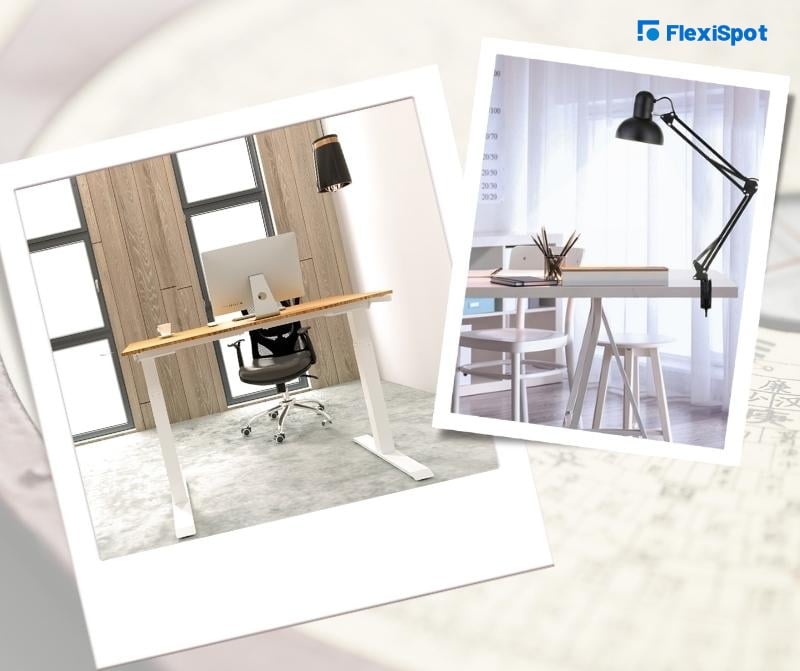
1. Positioning
The desk position in an office is a critical point in applying Feng Shui principles to your office’s organization. It would be best if you positioned your desk to face the door or entrance of your office regardless of whether it’s a standing or sitting desk. The reason for having the desk face the entrance is so that you are in a position of command.
It is thought that when you’re facing the entry, you’re able to see anything or anyone entering, so you’re not caught by surprise. If you’re facing away from the door, then people can easily ’backstab’ you. Figuratively, seeing what is coming towards you makes you better placed to conquer the world- in this case, you’re able to thrive at the workplace as you know what exactly to expect since you see it coming.
Now, we also know that given the workspace dynamics, it’s not always possible to have the desk facing the door. For instance, you might be forced to have your desk facing a wall due to the office design. Your office space may house workers in excess, such that there’s no space available. You don’t have to worry because there’s an alternative. You can hang a mirror in such a way that you’re able to see the office entrance using the mirror.
A natural source of light is also essential in feng shui. The most ideal position is to have a window on the side of your desk. However, this may not always be possible to achieve. Further, some people use their desks mostly at night, so natural light is not an option. In such cases, you could have a desk lampwhich you should place in the upper left position of your desk.
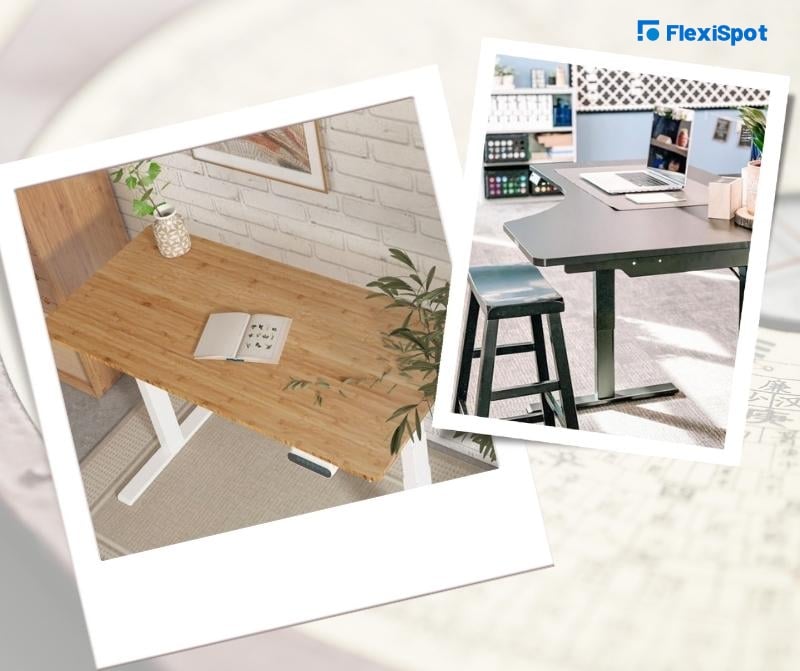
2. Desk Shape
Typically, the choice of desk shape depends on functionality and preference, whether it’s for an individual workspace or a communal one. Feng shui recommends a rectangular desk shape because it provides stability to concentrate on work, thus fostering growth. You could also use a curved desk since it’s thought to promote creativity. The curved shape symbolizes a continuous flow of positive energy, and it also offers stability. However, with a curved desk, you need to position your chair on the inside of the curve.
Some people prefer L-shaped desks, but you have to be cautious with their positioning. Make sure you place the desk in line with feng shui principles to ensure you have a flow of positive energy.
Many people lack the luxury of space, so many office desks are square since the shape is suitable for smaller areas. Interior designers who follow feng shui guidelines don’t recommend square desks because they lead to energy stagnation. However, if your space can only accommodate a square desk, you can add glass accessories to offset the stagnation. Circular and oval-shaped desks are discouraged as they don’t offer stability even though they might be practical for large groups.
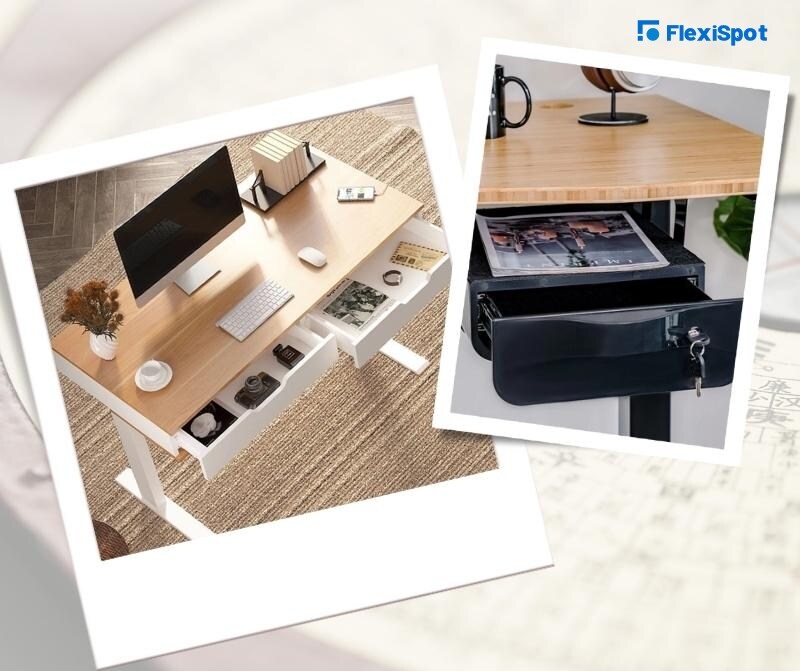
3. Dealing with Clutter
Having too much clutter on your desk can cause confusion, anxiety, disorganization, and affect overall productivity. Busy schedules often hinder the daily decluttering of your desk and office space in general. Feng shui principles recommend removing items that you don’t need and keeping your desk clean because clutter interferes with positive energy flow. You can place items you are not using in a drawer in your desk and only retrieve them when needed.
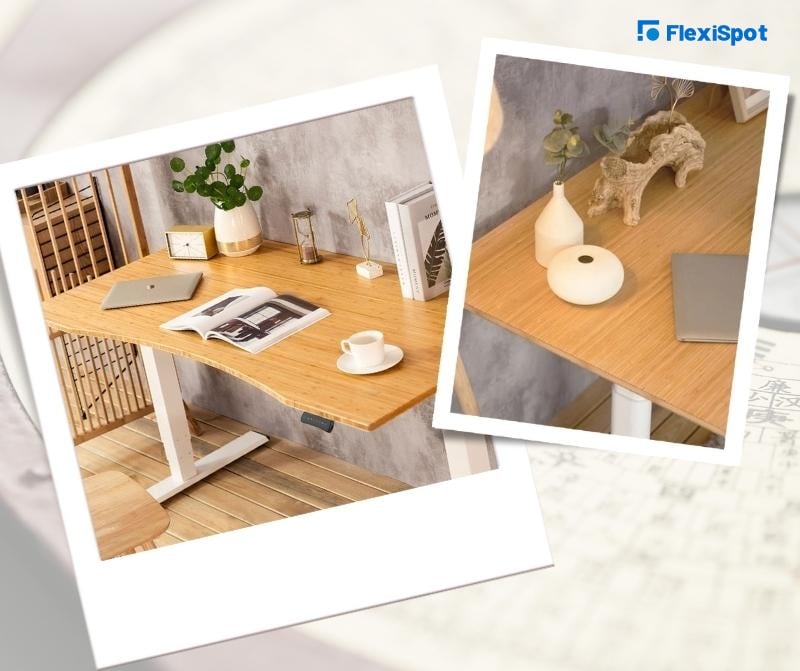
4. Arranging Other Objects on Your Desk
Feng shui organization of objects follows the Bagua map principles. The Bagua map depicts eight areas that are central to life. Bagua combines yin and yang and the five elements (water, fire, earth, wood, and metal) among other Chinese philosophies to guide the colors, material, and placement of items in a space.
Upper Left Corner- Wealth and Prosperity
You should place items that symbolize wealth and prosperity in this corner, like art, bamboo plants, and collectibles. The items can either be purple or gold and should capture the element wood. This space should symbolize abundance and gratitude for things already present in your life.
Upper Section Center- Fame and Reputation
Place items associated with fame and your reputation such as business cards, nameplates, awards like a trophy in the upper central section. The objects signifying this sphere of life fall under the element of fire. The items should be in the color red or yellow. These items represent how you think or want people to view you.
Upper Right Corner- Romance and Love
If you have a romantic partner, you can place a personalized photo in the upper right corner of your desk. Single people can also set a pink flower since this area doesn’t only dwell on love from others but also self-love. The pink color is used in this space, and the item should represent the earth element.
Center- Health and Well-being
This is the core of your life, and it is more important than all other aspects because, without health, other spheres suffer. It’s advisable to leave this section clutter-free. However, if you must place something in this section, it should be yellow, orange, or brown, which are associated with the earth element. You can have square items like a calendar or sticky notes.
Right Center- Creativity and Children
This section signifies an open spirit to learn and try out new things. It also symbolizes the things that bring joy in life. The space should have grey or white items. You can place your pen holder, circular or oval frames, and it’s associated with the metal element.
Bottom Center- Career and Life Purpose
This section represents your purpose in life and your career path. It’s recommended to leave this space clutter-free. However, you could have glass decorations and place items related to your career, such as your qualifications. This sphere of life is linked to the water element, and your items should be in black or blue.
Left Center- Family and New Beginnings
This section represents your heritage, that is, the family you come from and the one you will build in the future so you can have a family photo. The colors associated with the sphere of life are green, teal, and brown. Wood is the element related to this area of life.
Bottom Left Corner- Knowledge and Wisdom
You should place items associated with building new skills, gaining new knowledge, such as books. The section is linked to the element earth, and you should use the colors like beige and dark blue.
Bottom Right Corner- Helpful People and Travel
In this section, you put items linked to outside forces that help you, such as mentors, friends, or spiritual items that you think to offer you protection. It also signifies aspirations to travel so you can place a map. Other items could be a phonebook or a globe. This section is associated with the element metal, and your items should be grey or white.
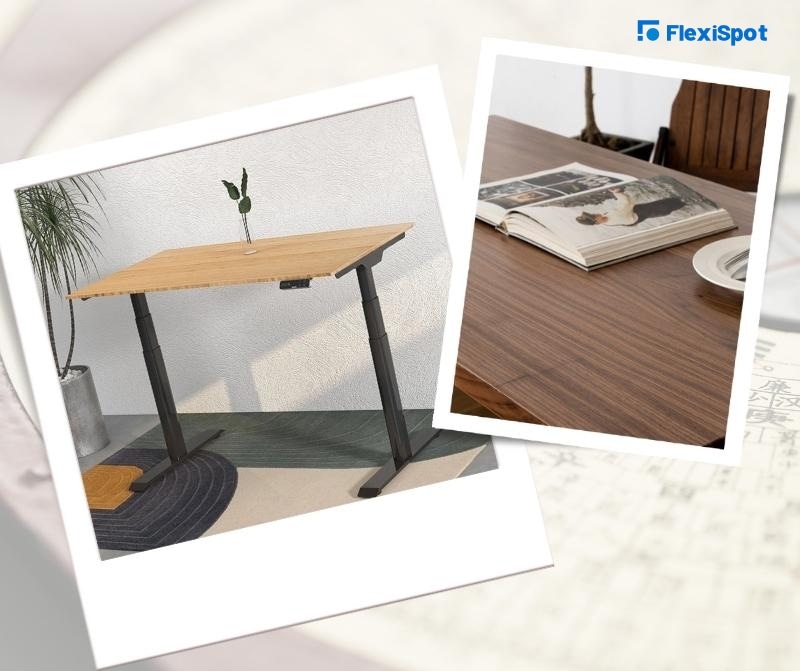
5. Color and Material
Feng shui principles suggest that materially affects the flow of energy. Ideally, following these guidelines, a wooden desk like the Kana Bamboo Standing Desk from Flexispot is preferred because wood is associated with stability, reliability, and a good flow of energy. However, you could also get a metal desk as it offers energy that fosters clarity and mental sharpness. If you decide to buy a glass desk, you need to add accessories or place items on your desks made of natural elements because energy passes quickly through the glass. A glass desk is ideal if your line of work emphasizes communicating transparency.
In many offices, laminate desks are popular because of their convenience. Energy-wise, laminate desks provide neither positive nor negative energy. To align a laminate desk with Feng shui principles, you can place it in the recommended positions to foster positive energy. It’s also recommended that you pair your office desk with a robust and ergonomic office chair that symbolizes command.
Similar to material, color is significant while choosing your office desk and chair. Different colors breed different energy and vibes. The choice of color depends on your line of work or your objectives while using that office space.
Green and earth tones foster growth and balance as the colors are associated with nurturing. Having the green color around your office desk could encourage creativity.
Red, yellow, orange, and other bright colors are ideal for sparking creativity and uplifting your mood. However, they can also be overwhelming, so they might not be suitable in the long term.
White can foster creative energy. It also represents clarity. Too much white can also be draining, so you need to add a few earth tones for balance.
Dark brown is a symbol of stability and strength. A brown desk could provide comfort to your body; however, you need brighter colors or objects to stimulate your mind.
Grey fosters focus, so if your line of work requires extra concentration, grey is the ideal choice. You should, however, note that too much grey can be draining, so you’d need to add earth tones to balance out the energy.
Black attracts energy inwards, so it’s ideal for new opportunities, creativity, and open-mindedness.
Final Thoughts
Feng Shui’s guiding principles are not so rigid and are practical in many fields. Whether you’ve already set up your office desk or you’re planning to set up one, it’s pretty easy to incorporate feng shui principles. It’s also easy to balance out your personal preferences with recommended practices to achieve balance.
Ultimately, you want to have an office desk and space that fosters creativity and growth, so incorporating feng shui is a welcome idea. If you have a small personal office desk, you could read up on feng shui principles to learn how to apply them in your space. However, if you have ample office space, it’s advisable to get a professional interior designer specializing in feng shui to help you design your office space.